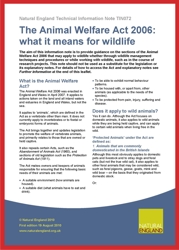Hot off the press is a new Information Note from Natural England which provides guidance on the Animal Welfare Act 2006 and what it means for wildlife.
The publication of this leaflet couldn’t be timelier. It follows hot on the heels of the successful prosecution under the Animal Welfare Act 2006 of the Staffordshire plumber who drowned a grey squirrel that he had caught in his garden and, more recently, the attempt by the chairman of Morpeth Red Squirrels to test that judgement.
|
The seven-page A4 leaflet explains how the Animal Welfare Act applies to all vertebrates. Whilst its primary focus is domesticated animals, from the pest management perspective, it is important to note that the Act also applies to feral animals, on the basis that they originated from domestic stock (e.g. feral pigeons, geese, goats, mink or wild boar) and to wild animals while they are being held captive or under the control of man (e.g. in a cage trap, snare or even simply held in the hand). The Act also clearly defines who is responsible for an animal saying that ‘a person is responsible where, on a permanent or a temporary basis, they have assumed responsibility for the animal’s day-to-day care or for its care for a specific purpose’. So a pest controller who holds an animal in a cage trap is responsible for that animal. In practice this means that person must provide a suitable environment, a suitable diet and protection from pain, suffering, injury and disease. The leaflet also outlines the offences under the Act. Of particular relevance to pest control are ‘unnecessary suffering’ and ‘administration of poisons’. |
|
|
|
Unnecessary suffering can result either from an act or a failure to act by a person who knew or ought reasonably to have known that what they were doing or not doing would cause unnecessary suffering. Published on 19 August, the new leaflet can be downloaded from Natural England’s website or by clicking here. |
||


